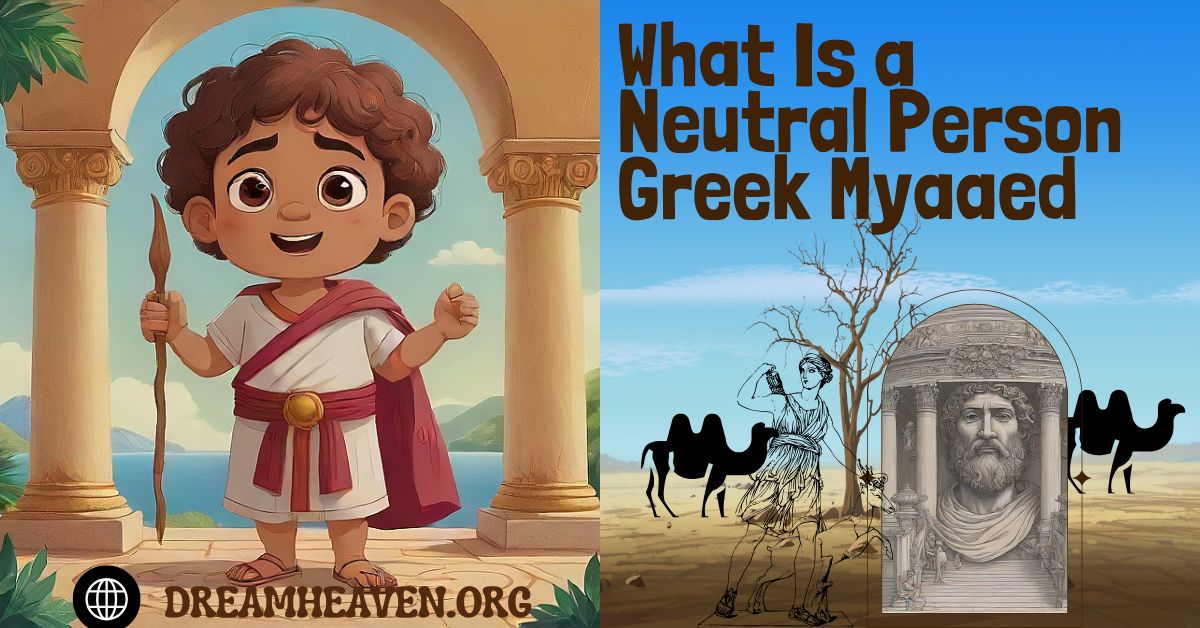The phrase “what is a neutral person Greek myaaed” might seem puzzling, but it invites curiosity. Neutrality has always been a significant concept in philosophy, culture, and even daily life. Combining it with “Greek myaaed” adds an intriguing layer, prompting us to explore its potential meanings and contexts.
This article delves into the concept of neutrality, its connection to Greek ideals, and the mystery behind the term “myaaed.”
What Is a Neutral Person?
A neutral person is someone who avoids taking sides in a conflict, debate, or decision. They strive to remain impartial, focusing on facts and fairness rather than personal opinions or emotions. Neutrality is often associated with mediators, diplomats, and judges, whose roles require balance and objectivity.
In the context of “what is a neutral person Greek myaaed,” neutrality might align with ancient Greek values of moderation and rationality.
The Greek Perspective on Neutrality
Ancient Greek philosophy often emphasized balance and reason. Philosophers like Aristotle spoke about the “Golden Mean,” a principle advocating moderation between extremes. In this sense, a neutral person could embody the ideal of maintaining harmony by avoiding bias or excess.
“Greek myaaed” might reference a cultural or philosophical connection to these ideals, blending neutrality with classical wisdom.
Unpacking the Term “Greek Myaaed”
The phrase “what is a neutral person Greek myaaed” introduces the term “myaaed,” which appears enigmatic. It could be:
A Typo or Misspelling: Perhaps a miswritten or misunderstood word.
An Acronym: It might stand for a concept, name, or idea.
Symbolic Reference: It could symbolize a deeper meaning, such as a unique interpretation of neutrality.
Without a clear definition, the term invites speculation and creative exploration.
Neutrality in Greek Mythology
Greek mythology also offers examples of neutrality. Some gods and figures refrained from taking sides in mortal conflicts, embodying impartiality. For instance, Themis, the goddess of justice, represented fairness and balance, qualities central to neutrality.
This mythological connection might hint at the deeper roots of “what is a neutral person Greek myaaed.”
The Role of Neutrality in Modern Times
Today, neutrality remains vital in various fields, including:
Politics: Neutrality helps mediators resolve disputes.
Media: Journalists aim to report facts without bias.
Personal Relationships: Staying neutral can maintain harmony in conflicts.
Understanding “what is a neutral person Greek myaaed” could highlight how neutrality applies in contemporary settings.
Challenges of Being Neutral
Being neutral isn’t always easy. Neutral individuals may face criticism for not taking a stand, especially in emotionally charged situations. However, their role is crucial in fostering dialogue and understanding.
The concept of “what is a neutral person Greek myaaed” might reflect these challenges, blending historical and philosophical perspectives.
Neutrality as a Strength
Far from being passive, neutrality requires active listening, empathy, and a deep understanding of different viewpoints. It’s a skill that fosters resolution and progress.
In the context of “what is a neutral person Greek myaaed,” neutrality might symbolize this powerful balance between action and inaction.
The Mystery of Myaaed
While “myaaed” remains undefined, its inclusion in the phrase sparks curiosity. It could be interpreted as:
A metaphor for balance or harmony.
A symbolic connection to Greek philosophy.
A creative play on language, blending new and old concepts.
By asking “what is a neutral person Greek myaaed,” we explore not just neutrality but the importance of curiosity and open-mindedness.
Applying Neutrality in Daily Life
Neutrality can be practiced in various ways:
Listening Without Judgment: Understand others’ perspectives.
Avoiding Bias: Base decisions on facts, not emotions.
Encouraging Dialogue: Create spaces for open discussion.
These practices resonate with the ideals behind “what is a neutral person Greek myaaed.”
Neutrality in Art and Culture
Neutrality isn’t just a personal trait; it also appears in art, literature, and media. Greek art, for example, often depicted balanced compositions, reflecting harmony and moderation.
The phrase “what is a neutral person Greek myaaed” could echo these cultural values, bridging past and present.
Conclusion
“What is a neutral person Greek myaaed” is more than a phrase—it’s a gateway to exploring neutrality as a concept rooted in Greek ideals and modern relevance. Neutrality represents balance, fairness, and the courage to navigate complexities without bias.
Though “myaaed” remains a mystery, it adds depth and intrigue, encouraging us to think creatively and remain curious.
FAQs
1. What does “what is a neutral person Greek myaaed” mean?
It explores neutrality, potentially linked to Greek philosophy, though “myaaed” is open to interpretation.
2. Why is neutrality important?
Neutrality fosters fairness, understanding, and resolution in conflicts and discussions.
3. How does Greek philosophy relate to neutrality?
Ancient Greeks emphasized balance and moderation, ideals closely tied to neutrality.
4. What challenges do neutral individuals face?
They may be misunderstood as passive or indecisive, but their role is vital for harmony.
5. What could “myaaed” signify?
It might symbolize harmony, creativity, or a unique interpretation of neutrality.

